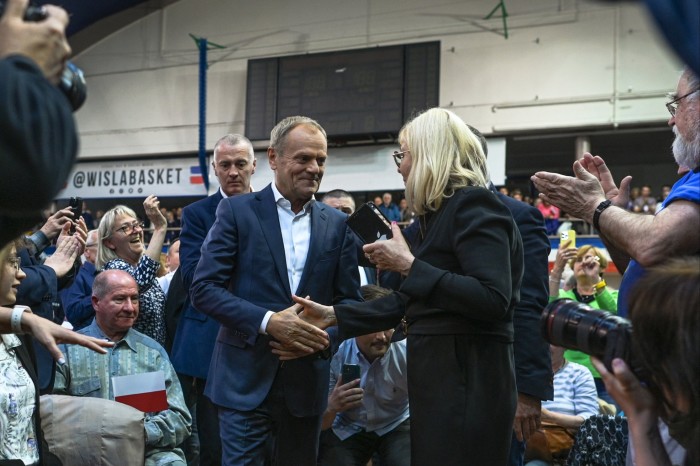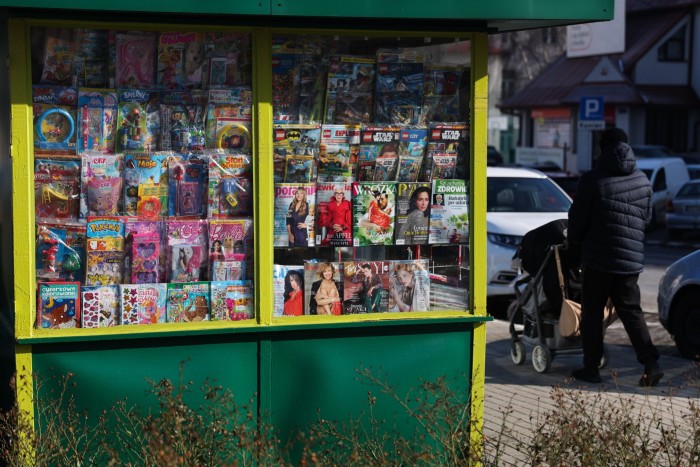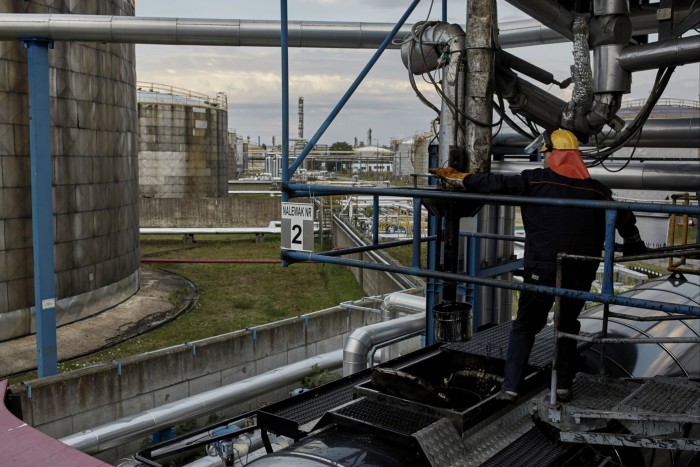Until a few years ago, Daniel Obajtek was the mayor of Pcim, a village whose name gets used derogatorily by other Poles to refer to a place in the middle of nowhere.
Now, Obajtek stands at the main crossroads of Polish business and politics, as chief executive of the state-controlled oil and gas group PKN Orlen, which is also the largest listed company in central Europe.
His lightning-fast rise from local politics to national prominence at the helm of Poland’s biggest company has been facilitated by a rightwing government that has sought to tighten its grip on Poland’s economy as well as other institutions, notably the judiciary.
And Orlen, with its white-and-red eagle logo that resembles Poland’s coat of arms, has become the country’s emblematic state company. Since taking charge in 2018, Obajtek has masterminded a takeover spree during which Orlen acquired several other domestic energy companies.
In 2021, Orlen also completed its purchase of Poland’s largest owner of regional newspapers, on the back of a government pledge to “repolonise” the media and reduce the influence of foreign media groups.
Obajtek’s appetite for deals seems far from satiated. The European energy crisis sparked by Russia’s all-out attack on Ukraine helped double Orlen’s revenues last year, so the company has a war chest of $80bn, and plans to spend $9bn on investments this year alone.

The rise of Orlen reflects Poland’s new status as a European bulwark against Russian influence and aggression. “Building a national and regional multi-energy champion is absolutely reasonable and matches perfectly the timing of Poland gaining critical importance in global geopolitics,” says Michał Piekarski, the partner responsible for energy and infrastructure in the Polish office of law firm Baker McKenzie, which has worked for Orlen.
But as Poles prepare to vote in a fiercely contested national election scheduled to take place this autumn, Obajtek and the company he runs have become central to a roiling political debate in Poland over the state’s influence on the energy market and the rest of the economy.
His tentacular reach and personal ties to Jarosław Kaczyński, the leader of Poland’s ruling Law and Justice party, or PiS, have drawn unflattering comparisons between Orlen and the chaebol model of family-controlled conglomerates that long dominated South Korea’s economy.
In particular, the company’s expansion into media has drawn it into the broader debate over whether Poland’s government has been respecting the rule of law, freedom of expression and individual rights including those of the LGBTQ community.
Opposition politicians have also been asking why Orlen was able to enrich itself thanks to higher fuel prices while Polish citizens struggled with soaring energy bills and 25-year high inflation. Opposition leader Donald Tusk accused Obajtek of being one of “Putin’s oligarchs”.
Obajtek, 47, insists that Poland’s ruling politicians do not dictate his strategy. Instead, he argued during an interview with the Financial Times that Orlen needed to gain clout in a fast-transforming energy sector that is also forcing the company to diversify away from fossil fuels.

If anything, Obajtek portrays Orlen as playing catch-up to European rivals such as France’s TotalEnergies, Italy’s Eni and Spain’s Repsol, which transformed earlier from state-owned oil refiners into diversified and global energy companies with the blessing of their governments.
“None of the mergers we have completed is a political one, that’s only what irresponsible [opposition] politicians say,” Obajtek says. “We do not build a chaebol. If that’s the case, then all European [oil] companies should be called chaebols. They went exactly the same path, they merged as Orlen is doing now, but these companies did it 10 to 20 years ago.”
Still, Obajtek’s critics see his activities as evidence that the state is seeking to leverage corporate interests to fulfil political ambitions. The government has pushed hard to return Poland to “full state control of the economy, month by month and sector by sector”, says Janusz Wiśniewski, a former chief operating officer of Orlen. “This seems very wrong.”
From mayor to magnate
Little in Obajtek’s past seems to have made him predestined to lead Poland’s corporate champion. He initially trained to become a vet, but then completed agricultural studies before turning to local politics.
In 2011 a violent storm hit the pepper farms around Obajtek’s village of Pcim. The mayor’s emergency response caught the attention of Kaczyński, who visited the area to show his support for rural Poland, a cornerstone of his party’s electorate.
In 2015 Kaczyński’s PiS won Poland’s election and returned to office, from where the new government appointed party-friendly managers in state-owned enterprises and other key areas, notably the judiciary.
Its replacement of judges sparked a continuing confrontation with the European Commission, which has withheld billions of EU funds to force Warsaw to guarantee the rule of law.
For Obajtek, PiS’s victory was the chance to leave second-tier politics and manage instead the state economy. In 2017 the government put him in charge of one of its electricity companies, Energa.
Only one year later Obajtek was fast-tracked to the top of Poland’s business ladder and appointed to run Orlen. Energa has since been one of his many acquisitions.
Over the five years he has been in charge, Obajtek has won plaudits from energy experts for the speed with which he executed deals, some of which had been considered under previous governments but never carried out. He also gets credit for prioritising investments in renewable energies such as offshore wind and nuclear power, which Poland needs to meet its EU commitments to cut greenhouse gas emissions and abandon its historic reliance on coal.

The company’s headquarters are in Płock, a city on the banks of the Vistula river where Poland’s then communist regime built the country’s flagship refinery. Orlen provides jobs for about 10 per cent of its residents and also contributes in taxes 10 per cent of the city budget, according to deputy mayor Artur Zielínski, a former Orlen engineer and third-generation employee of the company. He says Orlen’s boss is “of course a political man”, but with “more vision for Orlen” than predecessors.
Still, Obajtek’s Orlen appointment was unexpected even by the standards of a region of Europe where “politicians normally want influence over the economy”, says Wiśniewski.
“At a company like Orlen, the CEO was always friendly to the politicians, but his background came from oil and gas or international management,” he recalls. “Appointing Obajtek is like in the old communist times when you have somebody with no special skills who suddenly becomes CEO because of the decision of one person.”
Obajtek has faced various accusations of fraud and conflicts of interest, some of which underwent legal reviews but without producing any charge against him. One case dug into his political past and whether he had secretly managed a private company while mayor. Prosecutors closed an investigation without incriminating Obajtek.
The oil and gas executive has repeatedly denied wrongdoing and also requested in 2021 an audit of his assets by Poland’s anti-corruption office to counter claims that he had bought real estate assets with undeclared earnings.
“Do you know who gave me the greatest recognition? The so-called opposition media,” he says. “Sometimes I have been presented as a monster biting to death anyone who stands in its way. But in fact I am a very sensitive person who loves art, nature, landscapes, and has a very positive attitude towards other people.”
Delicate deals
But Orlen’s breakneck expansion has led it into highly politicised environments.
Last year Orlen significantly extended its domestic footprint by taking over oil and gas producer PGNiG as well as Lotos, another state oil company based in Gdánsk, the political fiefdom of the opposition Civic Platform party. The deals gave Orlen near-control over wholesale prices for oil in Poland: it now has more than 60 per cent of the market for diesel and 70 per cent for gasoline.
To overcome EU antitrust concerns, Orlen sold a stake in Lotos’s Gdánsk oil refinery to Saudi Aramco, Riyadh’s state oil company. It also sold 417 Lotos petrol stations to the Hungarian company MOL.
Both deals were controversial. The Aramco tie-in brought a country with an OPEC+ oil alliance with Russia into Europe’s refining sector. MOL’s expansion also raised eyebrows amid EU tensions over Hungarian prime minister Viktor Orbán’s pro-Russia stance.

Obajtek portrays Aramco as a politically neutral partner to guarantee Poland’s energy security and replace Russia’s crude oil. The deal includes a long-term contract to dramatically increase crude oil supplies from the Saudi company.
“I am playing a very clean business game with the Saudis and I do not intend to throw the Saudi side into the politics in this region and the Saudi side does not want to do it either,” he says. “They are neutral: this is an additional security benefit for us and our region.”
But Paweł Olechnowicz, who was removed as chief executive of Lotos after Pis won office in 2015, questions Obajtek’s claims about the neutrality of companies from countries whose geopolitical objectives have not always been aligned with Poland’s.
“If we’re thinking about energy security, I don’t see how the Saudis or MOL help Poland,” he says. “The idea that Saudi Aramco is good for Poland because we can buy its crude oil is nonsense because you can buy crude oil from the Saudis without having to sell assets to them.”
Orlen’s most debated investment is its takeover of the newspaper and magazine publisher Polska Press from the German company Verlagsgruppe Passau.
Since then, rival media bosses complain in private that Orlen has been starving them of advertising, even as the oil company has expanded its sponsorship across most aspects of Polish life, from the national football team to business conferences and cultural events.
Obajtek defends Orlen’s media ownership. “Why couldn’t we have our media?” he asks. “If it’s said to be an error, then why is one of the richest people in the world, Elon Musk, investing in mass media as well, [buying] Twitter, or Jeff Bezos in the Washington Post? I know many companies that through funds or other forms of shareholding own media outlets.”
Although the Polish state is Orlen’s largest and controlling shareholder, Obajtek says the government has not intervened in the editorial management of Polska Press.
Still, Obajtek personally withdrew in March a magazine issue whose cover was deemed to offend Catholics because it showed the late Polish Pope John Paul II holding a cross with a crucified doll, to illustrate an article about paedophilia among Polish priests.
Obajtek describes his magazine censorship as a one-off, but something that he would repeat if needed: “I will not allow Orlen to contribute to hurting religious feelings.”
For Orlen to own a media group is “not healthy because Orlen is clearly controlled by the government and an oil company has nothing to do with media,” says Zoltán Varga, a Hungarian entrepreneur who has publishing businesses in both countries — though he adds the situation in Hungary is far worse.
Some of the strongest criticism has come from outside Poland, notably from the Norwegian oil fund that is the world’s largest sovereign wealth fund and has a 1 per cent stake in Orlen.
In February, the ethics council of Norway’s sovereign wealth fund put Orlen under observation for “human rights concerns”, to monitor the Polska Press purchase and “its implications for freedom of the press and therefore freedom of expression in Poland”.
Norwegian criticism is also significant because Orlen has gasfields in Norway that are integral to Obajtek’s diversification goals.
While Norway allowed Orlen access to its gas, Oslo’s ambassador to Warsaw says Poland must now guarantee “a level playing field” in its own energy market, particularly in the award of new licences to build offshore wind farms.
Orlen is anchoring its green transition on this kind of renewable power, after signing a partnership with Northland Power of Canada in 2021. Last month Orlen won five out of the six licenses sold in the latest Polish auction, with state-owned utility PGE picking up the last one.
“We see tendencies that with the new licences, the Polish companies take them all,” says ambassador Anders Eide. For Warsaw to develop a national champion like Orlen is “completely fair and adequate, but it’s important that all companies are treated equally”.
European energy experts agree. “It seems natural for Poland to want its national utilities to lead the buildout of offshore in Poland but . . . this needs to be done by keeping foreign partnerships in place,” says Giles Dickson, chief executive of WindEurope, the industry’s European association.
‘A political man’
Obajtek might not even be involved in the next auction if Tusk, the opposition leader, wins this year’s election and ousts him from Orlen, which seems likely given their personal acrimony.
During a recent campaign rally, Tusk accused Obajtek of being “one of Putin’s greatest oligarchs”, claiming that he had kept Poland’s petrol prices exceptionally high while delaying a decision to end Orlen’s imports of cheap Russian oil.

But during the interview, Obajtek rejected this accusation and read out a list of past statements from Tusk to argue that he helped Russia, including when Tusk could allegedly have used his leadership of the European Council to oppose Russia’s Nord Stream pipelines.
“I have given you facts that show [that in terms of] who can be called Putin’s oligarch, the answer is only one: it is Donald Tusk,” Obajtek says.
Such an accusation could have serious repercussions after Poland’s parliament voted last month to create a special commission tasked with investigating people for pro-Russia activities.
The Polish opposition has denounced the commission as the start of a political witch hunt that could also directly threaten Tusk and ban him from office. On Sunday, opposition forces are planning a street protest in Warsaw to defend democracy against a law they call the government’s “Lex Tusk”.
But should the government win re-election, Obajtek would be a contender for a high-profile job inside it. He has been mentioned in Poland’s media as a possible replacement for Prime Minister Mateusz Morawiecki, particularly last year when an inflation-fuelled downturn lowered the government’s approval ratings.
Obajtek says his only ambition is to remain one of Europe’s most active dealmakers. “I have no ambition to be a prime minister, it was just to put me at odds with the [current] prime minister,” he says of the media reports. “My element is business: I am too dynamic for politics.”
Stay connected with us on social media platform for instant update click here to join our Twitter, & Facebook
We are now on Telegram. Click here to join our channel (@TechiUpdate) and stay updated with the latest Technology headlines.
For all the latest Business News Click Here
For the latest news and updates, follow us on Google News.
